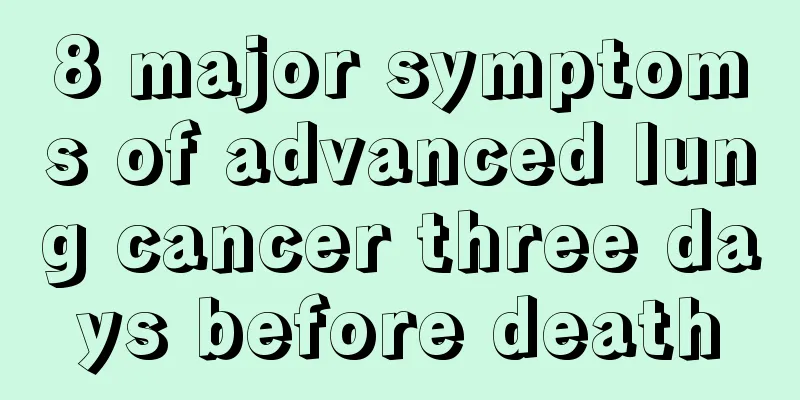8 major symptoms of advanced lung cancer three days before death

|
There are no absolute eight major symptoms before death in the late stage of lung cancer. Patients with advanced lung cancer may experience a variety of symptoms three days before death, including difficulty breathing, severe pain, confusion, extreme fatigue, coughing up blood, loss of appetite, etc. These symptoms may indicate that the patient is in the terminal stage of the disease. It is recommended to seek medical attention in time and take appropriate treatment measures according to the doctor's advice according to different situations. The details are as follows: 1. Breathing difficulties: Patients may experience severe breathing difficulties, with breathing becoming shallow and rapid. Advanced lung cancer is often accompanied by severe damage to lung function, leading to breathing difficulties. Use oxygen therapy or medication to relieve breathing difficulties, maintain indoor air circulation, and try to make the patient feel comfortable. 2. Severe pain: Patients may feel severe chest pain or pain in other parts of the body. The spread of cancer cells may compress nerves or bones, causing severe pain. Use analgesics, such as morphine and other strong painkillers, under the guidance of a doctor, and adjust the dosage of the drug to control the pain if necessary. 3. Confusion: The patient may be confused, drowsy, or unable to wake up. Metabolic abnormalities caused by tumors or side effects of drugs may cause confusion. Ensure that the patient is in a comfortable environment, reduce interference, and give sedatives if necessary to maintain the patient's tranquility. 4. Extreme fatigue: The patient will feel extremely tired and almost have no strength. Cancer consumes a lot of physical energy, and coupled with the side effects of treatment, the patient is prone to fatigue. Try to let the patient rest, reduce physical exertion, and provide high-calorie, easily digestible food and liquid nutritional support. 5. Coughing up blood: The patient may cough up bloody sputum or blood clots. Tumor erosion of lung tissue may cause bleeding. Keep the patient's airway open, use hemostatic drugs under the guidance of a doctor if necessary, and monitor the bleeding. 6. Loss of appetite: The patient may experience an extreme loss of appetite or no desire to eat at all. Advanced cancer is often accompanied by loss of appetite. Provide easily digestible liquid food to ensure that the patient has adequate nutritional intake and use nutritional supplements if necessary. In order to relieve these symptoms and improve the patient's comfort, family members and medical staff should take appropriate measures, such as the use of oxygen therapy, analgesics, nutritional support, etc. At the same time, it is recommended to seek medical treatment in time and take targeted treatment measures under the guidance of a doctor to ensure that the patient receives the best care at this stage. |
<<: Early symptoms and manifestations of lung cancer
>>: The first signal of cervical cancer
Recommend
How to relieve anal itching after hemorrhoid surgery
Hemorrhoids are a common disease. If the conditio...
Massage and health care exercises to prevent lymphoma
Lymphocytes can resist the invasion of foreign ba...
Symptoms of advanced cervical cancer
Many female friends may have heard of advanced ce...
How to deal with moldy shoes
When the weather is humid, we will easily find th...
What are the dangers of staying up late often
Many people nowadays, especially young people, li...
What is painless colonoscopy
Since the process of colonoscopy is painful, many...
What ointment to use for pubic hair removal
Most of the people who are more concerned about p...
Can I do fitness if I have teratoma?
Teratomas have different locations, often have mu...
What causes melanin deposition
Nowadays, many people pay special attention to wh...
How to treat herpes coronary artery? You should relieve this!
Coronary herpes is a common type of genital herpe...
What are the symptoms of people with liver disease
When our body suffers from some diseases, there w...
There is a hole in the tooth with a bad smell and bleeding
When we interact with others, it would be very em...
Why is there a dry pain at the junction of the upper jaw and nose?
If there is pain at the connection between the up...
What are the effects of pig bud grass
Pigweed is a wild herb that grows in many places ...
How long can one live with advanced lung cancer? What are the effective treatments for lung cancer?
Lung cancer can be said to be the most serious ma...









